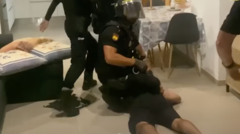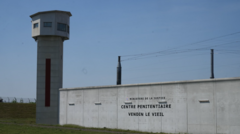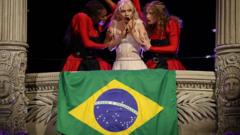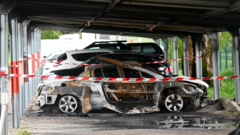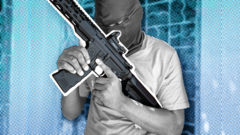The rise of gangs such as Pure Third Command in Rio's favelas has seen a troubling fusion of evangelical beliefs with drug trafficking, leading to religious intolerance against non-Christian faiths and escalating violence in affected communities.
The Dark Intersection of Faith and Crime in Rio's Favelas
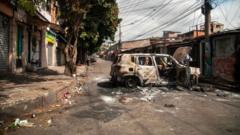
The Dark Intersection of Faith and Crime in Rio's Favelas
In Rio de Janeiro, drug-trafficking gangs blend evangelical Christianity with their criminal undertakings, implementing a regime of intimidation against opposing faiths within their territories.
The drug-trafficking Rio gangsters who see themselves as God's 'soldiers of crime' have created a perverse alliance between religion and criminal activity in Brazil's troubled neighborhoods. When law enforcement seizes large quantities of narcotics speckled throughout Rio de Janeiro, it is increasingly common to discover these illicit drugs emblazoned with the Star of David. This emblem, however, has little to do with Judaism; instead, it reflects the beliefs of certain Pentecostal Christians who assert that the return of Jewish people to Israel will hasten the Second Coming of Christ.
The gang behind this branding is the Pure Third Command, notorious for both ruthlessly eliminating rivals and fervently practicing evangelical Christianity. Their dominion stretches over a swathe of favelas in Rio's north zone, now known as the Israel Complex, a territory they believe is ordained to them by divine revelation. Theologian Vivian Costa, author of "Evangelical Drug Dealers," contends that these gangsters consider themselves "soldiers of crime," viewing Jesus as the rightful ruler of their territory.
Amidst this chaotic religious milieu is Pastor Diego Nascimento, a former high-ranking member of the infamous Red Command gang. Nascimento's transformation from a life of crime began when a gangster introduced him to the teachings of Jesus during a moment of vulnerability. Today, he works diligently in prisons to aid former criminals in their recovery journeys. Nascimento, however, vehemently argues against the notion of religious criminals, insisting that true followers of Christ cannot coexist with drug dealing.
As evangelical Christianity burgeons in Brazil — projected to eclipse Catholicism by the decade's end — it has become emblematic of hope within impoverished, crime-ravaged communities. Yet, as gangs have integrated elements of faith into their criminal enterprises, they have simultaneously stifled the expression of other religious beliefs, particularly those of Afro-Brazilian traditions. Christina Vital, a sociology professor at Fluminense Federal University, emphasizes the suffocating atmosphere in favelas where competing faiths face brutal suppression, often leading to declarations on walls indicating that only Christian practices are permitted.
Dr. Rita Salim, head of the Rio police's Department for Racial and Intolerance Crimes, notes that the violence propagated by narco-gangs carries implications far beyond mere crime, entwining fear and oppression with religious discrimination. The situation has reached a crisis level, certainly exacerbated by individual gang leaders exerting dominion over community practices by imposing Christian iconography across their territory.
While the confluence of faith and crime is not a novel phenomenon in Brazil—historically, criminal organizations have gravitated toward Afro-Brazilian deities for protection—the current trends mark a significant and troubling evolution. Marcio de Jagun, a high priest of the Candomblé religion and a municipal coordinator on religious diversity, characterizes the uptick in gang violence against Afro-Brazilian religions as a form of "neo-Crusade," drawn from deep-seated religious and ethnic prejudices.
This intertwining of religious fervor with criminality, often referred to as "Narco-Religiosity," not only undermines the fabric of community life but also undermines the constitutional guarantee of freedom of religion in Brazil. As these violent drug traffickers continue to hold sway over the favelas, they pose an increasing threat to the very rights and identities of the people they dominate, turning everyday life into an ongoing struggle for survival and belief.
The gang behind this branding is the Pure Third Command, notorious for both ruthlessly eliminating rivals and fervently practicing evangelical Christianity. Their dominion stretches over a swathe of favelas in Rio's north zone, now known as the Israel Complex, a territory they believe is ordained to them by divine revelation. Theologian Vivian Costa, author of "Evangelical Drug Dealers," contends that these gangsters consider themselves "soldiers of crime," viewing Jesus as the rightful ruler of their territory.
Amidst this chaotic religious milieu is Pastor Diego Nascimento, a former high-ranking member of the infamous Red Command gang. Nascimento's transformation from a life of crime began when a gangster introduced him to the teachings of Jesus during a moment of vulnerability. Today, he works diligently in prisons to aid former criminals in their recovery journeys. Nascimento, however, vehemently argues against the notion of religious criminals, insisting that true followers of Christ cannot coexist with drug dealing.
As evangelical Christianity burgeons in Brazil — projected to eclipse Catholicism by the decade's end — it has become emblematic of hope within impoverished, crime-ravaged communities. Yet, as gangs have integrated elements of faith into their criminal enterprises, they have simultaneously stifled the expression of other religious beliefs, particularly those of Afro-Brazilian traditions. Christina Vital, a sociology professor at Fluminense Federal University, emphasizes the suffocating atmosphere in favelas where competing faiths face brutal suppression, often leading to declarations on walls indicating that only Christian practices are permitted.
Dr. Rita Salim, head of the Rio police's Department for Racial and Intolerance Crimes, notes that the violence propagated by narco-gangs carries implications far beyond mere crime, entwining fear and oppression with religious discrimination. The situation has reached a crisis level, certainly exacerbated by individual gang leaders exerting dominion over community practices by imposing Christian iconography across their territory.
While the confluence of faith and crime is not a novel phenomenon in Brazil—historically, criminal organizations have gravitated toward Afro-Brazilian deities for protection—the current trends mark a significant and troubling evolution. Marcio de Jagun, a high priest of the Candomblé religion and a municipal coordinator on religious diversity, characterizes the uptick in gang violence against Afro-Brazilian religions as a form of "neo-Crusade," drawn from deep-seated religious and ethnic prejudices.
This intertwining of religious fervor with criminality, often referred to as "Narco-Religiosity," not only undermines the fabric of community life but also undermines the constitutional guarantee of freedom of religion in Brazil. As these violent drug traffickers continue to hold sway over the favelas, they pose an increasing threat to the very rights and identities of the people they dominate, turning everyday life into an ongoing struggle for survival and belief.



